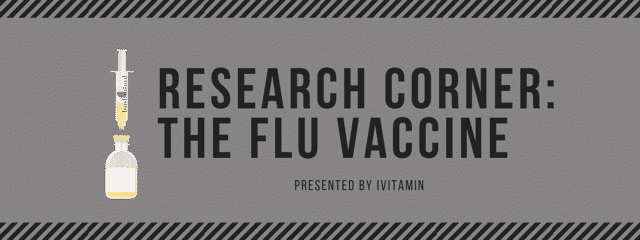Written by Bonnie McLaughlin for IVitamin
Even though fall seems to be toying with us Texans currently, we are definitely in that lovely time of year where flu season is the topic of conversation on every morning show and evening advertisement. Not one to shy away from public interest, we decided to answer your burning questions about flu shots as well as address some research about Vitamin D’s potential for offsetting infections. Just like anything else, the discussion surrounding flu shots and vaccinations tends to be a little nuanced and can be complicated so we did our best to whittle down the pros and cons to something a little bit easier to process.
Not sure if you need/want/should get a flu shot? Read on!
Do people really die from the flu?
Yes, but the exact number is impossible to determine. According to the Centers for Disease Control and Prevention (CDC) 61,000 people *eek* died from the flu between October 2018-May 2019. Now, this was a particularly dangerous strain (according to the CDC approximately 12,000 deaths is considered a “mild flu season”) and experts are predicting yet another rough flu season for 2019-2020.
The problem with these numbers is that the CDC doesn’t differentiate between people who died from a secondary infection due to lack of medical attention for the primary infection (the flu). They also don’t reveal how many of those people who passed away received a vaccination. And on top of all of that, they admit that most cases “are never tested for virus infection” so they use “indirect modeling methods to estimate the number of deaths associated with influenza.” So that 61,000 people could be massively inflated or at the very least, lacking in context.
How well does the flu shot actually work?
This one should really be explained in about 10 pages but I only have a few sentences so here goes. The vaccines that are closest to the strains of influenza that we end up experiencing work the best, but since doctors have to pretty much predict which strain(s) will hit us, some years are more effective than others. According to the Mayo Clinic, past studies show that on average, the flu vaccine is about 50-60% effective in healthy adults between the ages of 18-64. They also state that in cases where the vaccine doesn’t fully prevent the flu, it can lessen the severity of the illness and the risk of serious complications.
However, it is important to note that flu vaccinations have side effects (and no, getting the flu is not one of them contrary to popular belief). Some people have reactions to the vaccine that include aches, fever, redness or swelling at the injection site, dizziness or fainting, and in rare cases, Guillain-Barré syndrome (GBS), a disorder in which your own immune system damages your nerve cells, causing muscle weakness and sometimes paralysis. It is estimated that 3,000-6,000 people contract GBS each year and 2/3 of those people develop symptoms for GBS following respiratory illnesses, the flu, or the flu vaccine.
If I decide to get the flu shot, when should I get it?
It’s advised to get your flu shot by the end of October as it takes about two weeks to work through your system and become effective. The Mayo Clinic states that it takes up to two weeks because your body is building up the necessary immunity to the strain(s) that doctors have predicted for each season.
Also, if you are considering getting a flu shot, keep in mind that there are benefits even if you get one after flu season starts. So just because you forgot to get your shot and it’s December doesn’t mean you have to skip it altogether. Doctors report that flu season starts in October, hits its peak in December, and can stick around to torture us until May so if you’ve escaped the flu and it’s February, you might want to still consider getting the shot.
What about the Vitamin D study you mentioned?
So the study that is making its rounds through the media concerns the potential for Vitamin D to act as an antiviral with some promising results. Researchers at Queen Mary University of London compiled data from 25 studies with over 10,000 participants centered on whether vitamin D supplements would cut the number of infections they experienced. Overall, participants saw about a 12% decrease in respiratory tract infections (including the flu) but the result that is being splashed across your newsfeed is that people with vitamin D deficiencies saw their risk for infection cut in half. In other words, the people with the lowest vitamin D levels saw the largest benefit from the supplements.
So should you head out for a Vitamin D supplement? That’s really up to you. Scientists do encourage people to ensure that their diets include fortified foods with vitamin D such as dairy products, oily fish like salmon, and orange juice as studies continue to investigate just how Vitamin D can prevent viral infections. Current research tells us that that if you are already getting the recommended dose of vitamin D from your diet, supplements may not produce any further benefits but newer research proposes that large doses of Vitamin D over a restricted period of time may increase your likelihood of avoiding illness.
However, if you’re in the group of people not getting the recommended daily dose (600 IU/international units for most adults), supplements can make up the difference but it is vital that you ensure that they come from a reputable source such as a medical clinic or natural grocers (just be sure to always do your research so you don’t end up with something chock full of unnecessary fillers). And if you’re interested in supplementing with Vitamin D just be sure to talk to your healthcare professional before you begin any treatments with higher doses as blood levels must to measured regularly to avoid any calcium buildup in your blood.
If you are curious about your vitamin levels, consider having a micronutrient test done to ensure your levels are healthy before increasing your intake. IVitamin offers Micronutrient Testing at their Austin clinic so check out this link for more information and to book: https://ivitamintherapy.com/menu-2/#boosters-section.
What other ways can I protect myself from the flu if I choose not to be vaccinated?
The CDC argues that the flu shot is the best way to protect yourself from the flu but if you’d rather not go that route there are plenty of common ways to lessen the chance that you get sick such as washing your hands often with soap and water (be thorough! I can’t be the only one humming “row row row your boat” like they taught us in kinder to make sure I scrub long enough), not touching your eyes, nose, or mouth when possible, avoiding crowds when you know the flu is prevalent in your area, and practicing good health habits like getting plenty of sleep, drinking water, exercising regularly, and eating well. A healthy body is not a good host for the flu so taking care of yourself just might make all the difference.
Also, do your fellow humans a favor and stay home if you have the flu. There is nothing more annoying than the person who drags themselves into work when they are sick as can be. No one is impressed, we are too busy drowning our offices in lysol and trying not to catch your strain of “socially-unaware coworker.”
Want to dive down the flu vaccine rabbit hole? Check out the links below for more information.
https://www.ncbi.nlm.nih.gov/pmc/articles/PMC1309667/
https://www.cdc.gov/flu/prevent/guillainbarre.htm
https://www.mayoclinic.org/diseases-conditions/flu/in-depth/flu-shots/art-20048000
https://aspe.hhs.gov/cdc-%E2%80%94-influenza-deaths-request-correction-rfc
https://www.womenshealthmag.com/health/a18708943/flu-shot-side-effects/
JOIN OUR COMMUNITY
Receive tips on wellness and nutrition, healthy food recipes, amazing workouts, events that bring our community together, and special offers directly to your inbox!
Contact & Visit
Hours of Operation
M: 10am-6pm*
Tu-W: 10am-4pm*
Th-Su: 10am-6pm*
* We seat the last patient 15 minutes before close time





